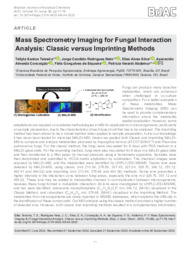Mass spectrometry imaging for fungal interaction analysis: Classic versus imprinting methods.
Mass spectrometry imaging for fungal interaction analysis: Classic versus imprinting methods.
Author(s): TEIXEIRA, T. S.; RODRIGUES NETO, J. C.; SILVA, E. A.; CONCEIÇÃO, A. A.; SIQUEIRA, F. G. de; ABDELNUR, P. V.
Summary: Fungi can produce many bioactive metabolites, which are enhanced when challenged in co-culture competition. For a better evaluation of these metabolites, Mass Spectrometry Imaging (MSI) can be used to provide complementary information about the metabolite spatial localization. However, some adaptations are required on available methodologies in MSI for applications in microorganisms, particularly on sample preparation, due to the characteristics of each type of cell that has to be analyzed. The imprinting method has been shown to be a robust method when applied to sample preparation, but to our knowledge it has never been tested for microbial MALDI-MSI. Herein we applied both Classic and Imprinting MALDIMSI to compare and analyze metabolites produced by Aspergillus terreus (ATCC® 20542TM) and Pleurotus pulmonarius fungi. For the classic method, the fungi were inoculated for 8 days with PDA medium in a MALDI glass slide. For the imprinting method, fungi were also inoculated for 8 days in a MALDI glass slide and then transferred to a filter paper by manual pressure using a homemade apparatus. Samples were then dehydrated and submitted to HCCA matrix application by sublimation.
Publication year: 2023
Types of publication: Journal article
Unit: Embrapa Agroenergy
Observation
Some of Embrapa's publications are published as ePub files. To read them, use or download one of the following free software options to your computer or mobile device. Android: Google Play Books; IOS: iBooks; Windows and Linux: Calibre.
Access other publications
Access the Agricultural Research Database (BDPA) to consult Embrapa's full library collection and records.
Visit Embrapa Bookstore to purchase books and other publications sold by Embrapa.

